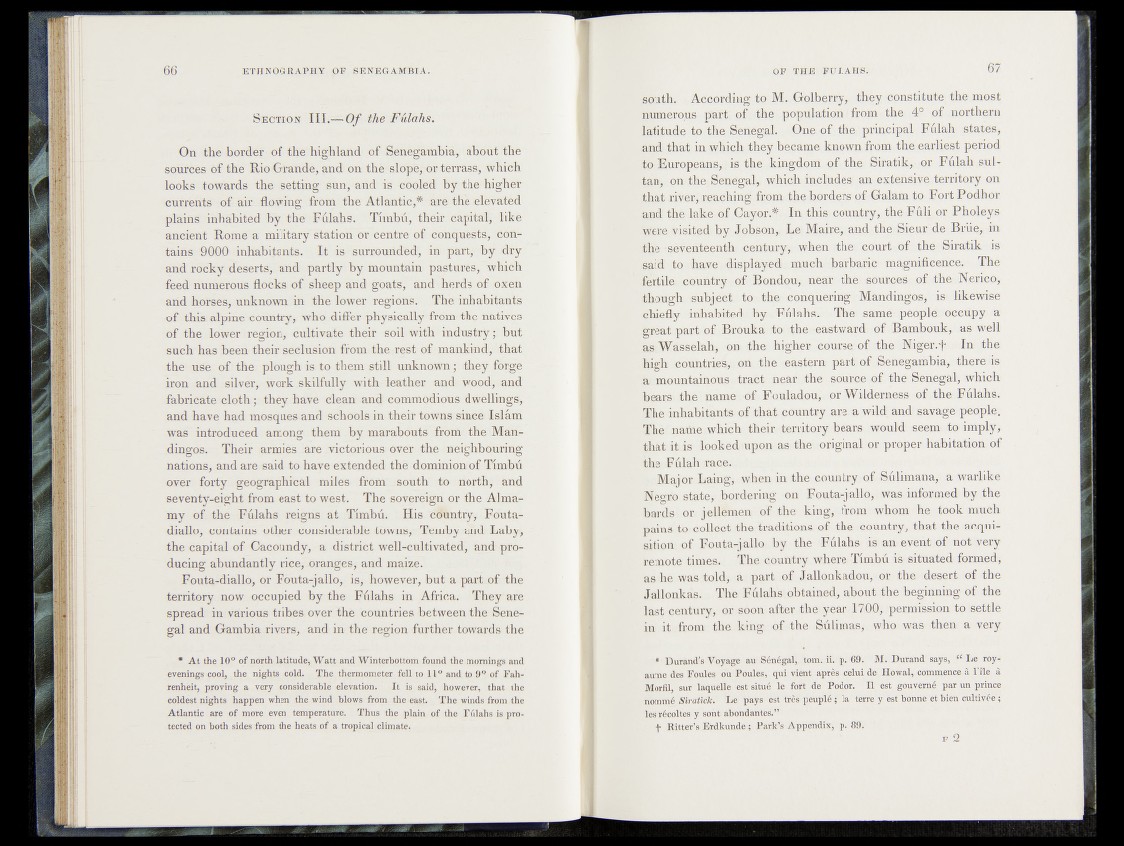
Section III.—-0 / the Fulahs.
On the border of the highland of Senegambia, about" the
sources of the Rio Grande, and on the slope, or terrass, which
looks towards the setting sun, and is eoeled by the higher
currents of air flowing from the Atlantic,* are the elevated
plains inhabited by the Fulahs. Timbu, their capital, like
ancient Rome a military station or centre of conquests, contains
9000 inhabitants. It is surrounded, in part, by dry
and rocky deserts, and partly by mountain pastures, which
feed numerous flocks of sheep and goats, and herds of - ©&en
and horses, unknown in the lower regions. The inhabitants
of this alpine country, who differ physically'from the natives
of the lower region, cultivate their soil with industry; but
such has been their seclusion fram? the -rest of mankind, that
the use of the plough is to them still unknown; they foBge
iron and silver, work skilfully with leather and wood, and
fabricate cloth; they have Clean and commodious dwelling
and have had mosques and schools in their towns, since I slam
was introduced among them by marabouts from the Man-
dingos. Their armies are victorious over the neighbouring
nations, and are said to have extended the dominion of Timbu
over forty geographical miles from south to north* and
seventy-eight from east to west. The sovereign or the Alma-
my of the Fulahs reigns at Timbu. His cdfentry, Fouta-
diallo, contains other considerable towns, Temby and Laby,
the capital of Cacoundy, a district well-cultivated, and producing
abundantly rice, oranges, and maize.
Fouta-diallo, or Fouta-jallo, is, however, but a part_of the
territory now occupied by the Fulahs in Africa. They are
spread in various tribes over the countries between the Senegal
and Gambia-rivers, and in the region further towards the
* At the 10° of north latitude, "Watt and Winterbottom found the mornings and
evenings cool, the nights cold. The thermometer fell to 11° and to 9° of Fahrenheit,
proving a very considerable elevation. It is said, however, that the
coldest nights happen when the wind blows from the east. The winds from the
Atlantic are of more even temperature. Thus the plain of the .Ffilahs is protected
on both sides from the heats of a tropical climate.
South. According to M. Gelbpriy, they constitute the most
numerous' pfrrfc ^ >t.he^.population i from the of northern
,latitude tp Q§te .of the;' pçi^acipal FhlaJh sta
and that in wbAdW^hev becam^n^whj^^éiîthe egrli^f period
^©[.EurO'peanS',;! is the-|l^g(|ptn ,q£;the- Siratik ^ r Fulah sultan,
on thejÇef'e'gal,'. w-hioh ini®|J|i^||£n ,fixtensiv%torritory on
.that river-, Reaching Galam to, Fort Podhor
and th,fe lake QjE.Gayoito Ia this s%©pnstry,. tbi^FûJ4.,ôr Phqlcys-
Were visited-by Jph&QiV Le! Mai^e,'^^-4hei^eujr'd.e Briie^in
the métoutoentb .century, when the; court bftfh.the Siratik is
isgtid tçw have displayed? muck!^rbarictpp@^#(?e|àe..> Tl|g
fertile country of Bond|o4 near theo^éuIrceA of tb&jfprieoy
iit^ugb subj ect feâè the conquep% " Mandiigf^dsst' likewise
chiefly inhabited by Fulahs^ The ahmë^fÈêople foüaSpy a
great part of Brouka to the eastward of Bambouk, as well
as Wâsselàhs oh the higher In tB$
high eountripÉsy on the .eastern part- theretoa
mountainous tract near the soiÉtoto® fié Senegal', wbièh
hears the name of Fouladou,'- or the Fulahs.-
The inhabitants of that country are a wild, an# sayageipeople.
The name which their territory hears would .seem-'to imply,
that it is looked upon as the, original or paperi-habitation of
ihe F ulah race..
Major Laingi, when in the country of Sulimana, a-warlike
vSHtgrib state*- boafderisjg on Fonta-jallh^ was. informed! % the
bards tor jelliknen of the king, -fronjhwhom he- took mu<i;
pains to< collect the traditions of the country, that the acquisition
of Fouta-jaHo by the Fulahs -isian- evenhof/nptWery
remote times. The country where Timbu .^situated formed,
as he was told, a part of Jallonkadou, or the desert of the
Jallonkas. The Fulahs .obtained, about {the beginning'of the
last century, or soon after they ear, 17.00, permission to mettle
in it from the king of the Sülimas, who was then a very
* Durand’s Voyage au Sénégal,, tom. ü. p* 69. M. Durand ’says, Le royaume
des Foules ou Poules, qui vient après celui, de. Howal, commence à l ’île à
Morfil, sur laquelle est situé le fort de Podor. Il est gouverné par nn prince
nommé Sirdtick. Le pays est très peuplé ; la terre y ést bonne’et Éièn'cultivée ;
les récoltes y sont abondantes.”
•f Ritter’s Erdkunde ; Park’s Appendix, p. 89.